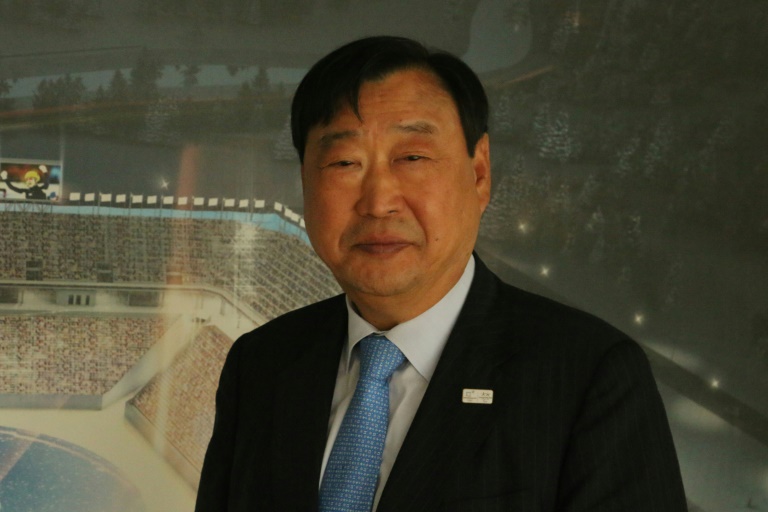With little more than 100 days to go before the 2018 Winter Olympics in South Korea, chief organiser Lee Hee-Beom has dismissed fears of a potential attack by the nuclear-armed North as an "exaggeration".
Several countries have expressed concerns about the Pyeongchang Games, which will take place in February just 80 kilometres (50 miles) from the heavily fortified Demilitarized Zone (DMZ) which divides the Korean peninsula.
North Korea carried out its sixth nuclear test in September — by far its most powerful yet — and has lobbed missiles over Japan into the Pacific, while trading insults and threats of war with Washington.
But Games chief Lee Hee-Beom told AFP that worries about a possible attack on Pyeongchang were overblown, and although contingency plans are in place, he does not believe they will be needed.
“Korea was not divided yesterday, Korea was divided since 1945,” the president of the Pyeongchang Organising Committee for the Olympic Games (POCOG) said in an interview.

Pyeongchang Winter Olympics chief organiser Lee Hee-Beom poses for a photo at his office, on October 27, 2017
The South has held several “very safe and secure sports events”, he said. “Pyeongchang is not the exception,” he added, calling fears of an attack “a kind of exaggeration”.
France, Germany and Austria have raised concerns over the safety of their athletes during the Games, while Britain has drawn up evacuation plans in case of an emergency.
The International Olympic Committee moved to quash speculation that the event could be cancelled or moved by pledging its “full support” to the Games at a summit last week.
– Wild card –
Lee pointed to previous major sporting events in the country, such as the 1988 Seoul summer Olympics and the 2002 World Cup, that passed off without a hitch — the latter despite a clash between the navies of North and South off the island of Yeonpyeong.
Alpensia sliding center in Pyeongchang
The United Nations will also pass an Olympic truce resolution in November calling for a cessation of conflicts before and during the Games, he added.
Pyongyang has been defying UN resolutions against its nuclear weapon and ballistic missile programmes for years, but Lee said this situation was “quite different”.
“North Korea violated resolutions against one country but if they do anything it’s a violation against all the world,” he said.
Lee spoke to AFP in his office in Pyeongchang before flying to Greece to collect the Olympic flame, kindled from the sun’s rays at the ancient temple of Hera in Olympia.
The flame will arrive in South Korea on Wednesday — 100 days before the opening ceremony — before being taken on a 2,018-kilometre relay through the country, avoiding both North Korea and the DMZ truce village of Panmunjom.
North Korean figure skaters Ryom Tae-Ok and Kim Ju-Sik are so far the only athletes from the country to qualify for the 2018 Pyeongchang Winter Olympics
Whether the North will participate in the Games in Pyeongchang, a largely rural area of rolling hills dotted with wind farms, remains open to question.
It boycotted the 1988 Seoul Olympics, and officials in Pyongyang have told AFP that no final decision has been made.
Two North Korean figure skaters are so far the only athletes from the country to qualify for the Games, and while others could do so in cross-country and short-track competitions running until January, their prospects are believed to be poor.
As a result, Lee said, the IOC will consult with international sporting federations over wild card entries to enable more North Koreans to take part.
– Ticket bail-out –
A North Korean presence would add to the safety and security of the Games, he added, but he did not expect Pyongyang to make a decision until the last minute.
“Those who respect peace should participate and can participate in the Olympic Games,” he said. “North Korea is not the exception.”
Lee added that South Korea’s education ministry, regional authorities and banks had agreed to buy hundreds of thousands of tickets to fill up the Games venues, if domestic sales continue to disappoint.
The 22 members of South Korea’s banking federation would take around 40,000 tickets if necessary, he said, with local governments committing to 120,000 and the education ministry almost 200,000 for distribution to students and teachers.
Over the two weeks of the Games, 1.18 million tickets are available, with 180,000 sold internationally so far.
With the host country a long way from the traditional winter sports markets of Europe and North America, attendance by South Koreans will be crucial.
Domestic sales are strong for blue-riband events such as ice hockey finals, and sports traditionally popular in South Korea, such as short track, speedskating, and figure skating.
But for disciplines such as luge and cross country skiing, they are weak, raising the embarrassing prospect of images of empty seats being beamed around the world.
“We found big gaps between high demand and low demand,” acknowledged Lee.
South Koreans have bought little more than 160,000, and at the current rate of about 3,000 per week it would take four years to sell out their allocation.
But Lee insisted: “It is not the calculation.”
Koreans are “late buyers”, he said, predicting a last-minute surge — and if it does not materialise, the authorities will step in.
“I am confident to achieve the full stadia,” said Lee.
Download our app